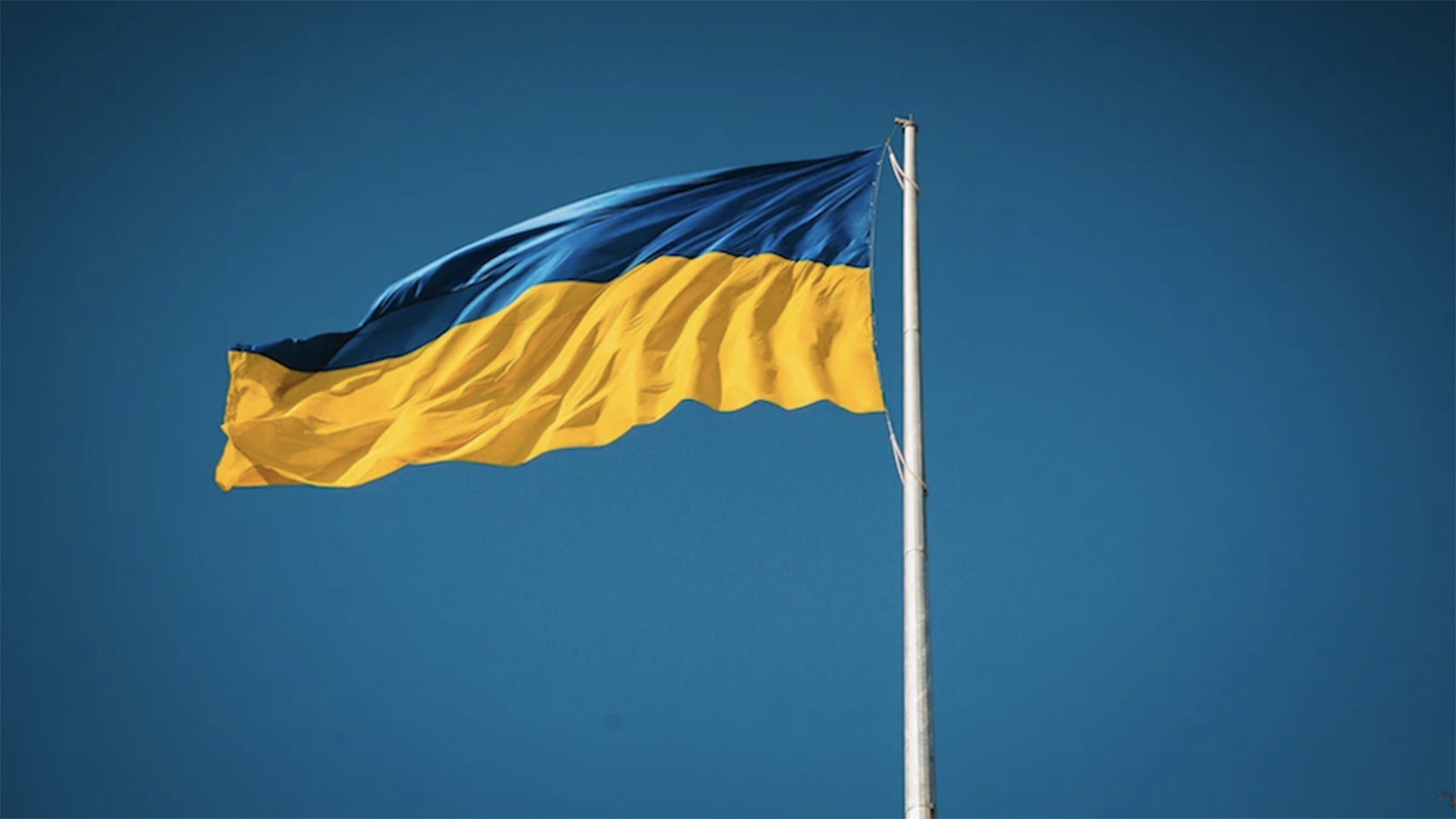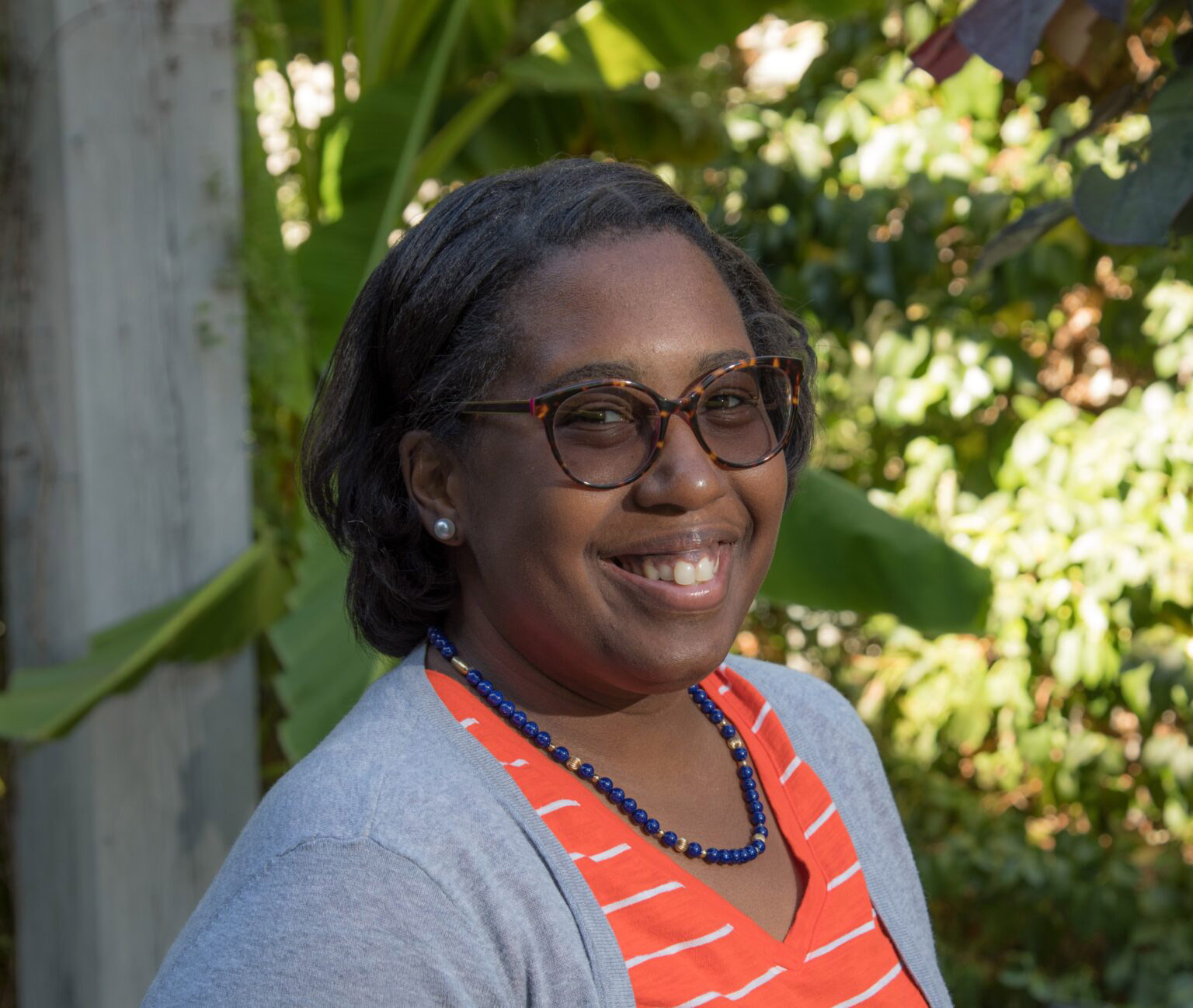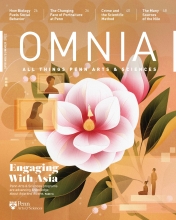OMNIA Q&A: The War in Ukraine
Kimberly St. Julian-Varnon, Ph.D. student in history, on the nation of Ukraine, how things got to this point, and what’s being overlooked in the discussion about the war.

As Vladimir Putin’s threats against Ukraine culminated in a military invasion, Twitter users and news organizations turned to doctoral student in history Kimberly St. Julian-Varnon for insight. As an undergraduate at Swarthmore, St. Julian-Varnon studied Soviet and Eastern European history, then took up Ukrainian history for her master’s degree at Harvard, because, as she explains, “I just fell in love with Ukraine.” She specializes in how the Black experience shaped identity in the Soviet Union, and she lived in Ukraine while conducting research in Kyiv and Odesa.
St. Julian-Varnon has spent much of the first days after the invasion speaking out on news outlets and Twitter, where her followers grew from 9,000 to more than 87,000. She pulls no punches; one tweet said, “I will fight disinformation and Russian propaganda as Ukraine fights a murderer and his henchmen. Putin, you will choke on Ukraine."
We asked St. Julian-Varnon about the nation of Ukraine, how things got to this point, and what’s being overlooked in the discussion.
What are some things we should know about how we arrived at this moment?
It starts with the Euromaidan protests in 2013. These were in response to then- [Ukrainian] President Yanukovych not signing the association agreement with the European Union. And the idea was that he did that because of influence by Putin. So you had massive protests throughout Ukraine in support of the European Union and the association agreement. The state security forces killed a hundred Ukrainian civilians—they're called the Heavenly Hundred.
After that, we saw Russian cyber-attacks, but also Russian aggression towards eastern Ukraine. The two regions, Donetsk and Luhansk, are occupied by pro-Russian forces. In these two occupied regions—we call them oblasts—you had pro-Russian forces getting in scrimmages with Ukrainian state forces. And you've had hot war conflict in that area for the past eight years—thousands of Ukrainians have died in the occupied spaces.
But in those eight years, I think it has kind of fallen off for a lot of Americans who don't pay attention to the region. Ukraine has suffered multiple cyberattacks from Russia. A couple years ago, Russia hit the electricity grid during winter. There has been constant hacking. Last week we saw attacks on the ministry of defense, the board ministry, and the two biggest banks in Ukraine. Their websites were shut down for hours. So Ukrainians have been living with the Russian aggression for eight years. And there are horrible stories of torture camps in far eastern Ukraine.
So, we shouldn't be surprised by Russia recognizing Luhansk and Donetsk as independent. I think that's been the end game. That's been the game since 2014. But [Putin] has no right to recognize them as independent because they're still Ukrainian. [The occupied pro-Russian regions] are two smaller parts of two bigger regions called Luhansk and Donetsk and we've seen it now that they were an entry point into greater Ukraine.
In the lead up to the invasion, President Vladimir Putin described Ukraine as “historically Russian land” and said that the country was “artificially created by Soviet leader Vladimir Lenin.” Can you talk about this reference and what role history plays in Putin's motivations?
Putin is lying. Lenin did not create Ukraine. So, what [Putin] forgets is that right-bank Ukraine [Western Ukraine] was not part of the Russian empire. It was part of the Polish-Lithuanian Commonwealth and after Poland was dismembered in the 18th century, it was part of Austria-Hungary.
And so this is a territory where Ukrainian nationalism is much stronger, Ukrainian language is stronger, and the ties to Poland are strong. The religion is different. So that is not part of this whole fantasy Putin has. Eastern Ukraine, or left-bank Ukraine, has had that long connection with the Russian empire and with the Soviet Union. But Kievan Rus’, something Putin constantly talks about, is like a medieval gathering of lands—it's principalities. There was no understanding of a Russian nation at this point. This is just putting out Russian nationalism and promoting it backwards, right? It's kind of unfair for Russia to claim that as its own when Ukraine has every right to.
After the collapse of the Russian empire in 1917, you have a civil war that breaks out in Ukraine. So, eastern Ukraine, they actually have an independent Republic—Putin skipped that part. They have an independent Republic that eventually joins the Soviet Union. And when the Soviet Union is created in 1922, every titular nationality or big national group gets its own territory, the promotion of its language and the promotion of its culture. So, Ukraine got its named territory, the Ukrainian Soviet Socialist Republic. They promoted Ukrainian language and Ukrainian culture.
This is what Putin sees as an aberration. This is why he says the Soviet Union was wrong and that Lenin created it. It's because compared to the Russian empire, the Soviets promoted Ukrainian nationalism to an extent. Throughout Soviet history, you have this problem of Ukrainian nationalism always being stamped down because it's a problem for the Soviet Union. And when the Soviet Union collapses in 1991, one of the major reasons is because Ukrainians voted to leave the Soviet Union. It could not continue without the bread basket that was Ukraine.
So Putin's understanding and conception of Ukraine being Russian or being one people, it's just fundamentally ahistorical. I speak Russian, and I'm learning Ukrainian. They're not the same language. They're similar, but they're not the same. Polish grammar and Polish language are actually closer to Ukrainian. The religion is different. You do have Eastern Orthodox people in eastern Ukraine, but you have Uniate people who follow the Eastern rites, so you have an Orthodox faith that follows the Pope in Ukraine.
And Ukraine has always been a multilingual country, and this is something that's so important because Putin says if they’re Russian speakers, then they're Russian. That's not true.
How does xenophobia play a role in Putin's motivations for military action?
So this is what's been interesting to me. If you think these people are Russians, why are you bombing them? If you think part of Kyiv is Russian, if you think Kyiv is the heart of the Russian nation, why are you destroying it? Odesa, especially, was the jewel of the southern Russian empire of Catherine the Great. And you're destroying it.
On the other hand, it's incredibly racist to think that Ukrainians aren't a people and to think that they are Russian. To have this country that is a different country, has a different culture, and to say, "No, you're Russians, but you don't know.” Or, “You're Russians and you've been led astray by the West." This is racist. But moreover, this is imperialist. Putin is embracing is a neo-imperialist idea of Ukraine. We saw this in the 19th century with the Russian tamp down on Ukrainian language. This is nothing new. He's just clothing it in new language.
We’ve already started to see a response by the Russian people to the invasion. How significant is this given Russia’s recent history and response to protest?
I have been pleasantly surprised. I know there's a lot of pressure on social media and people saying, "Russians, why don't you protest Russia? Why do you let Putin do this?" And I think that it's a misunderstanding of how much power regular Russians have in Russia. I mean, this is a country where [Russian opposition leader] Alexei Navalny is currently on trial and is facing 15 years, after he was almost murdered. This is a country that poisoned a previous president of Ukraine [Viktor Yushchenko].
So, I think it's really easy for everyone to be coy about what Russians should do. But you're not Russian. You don't know what it's like. And people in Russia today are in the streets and they're being arrested. They're being beaten. Journalists are being arrested. It's powerful. And I think Putin fundamentally misunderstood what the Russian people will put up with.
His response to Russian protests is him trying to establish authoritarian power in Ukraine, but also maintain authoritarian power in Russia.
The U.S. and other NATO countries have promised aggressive sanctions and some military aid to Ukraine. Is there any historical precedent for this type of response to be effective?
I hope sanctions work. But at this point I feel like it's too little too late. We can harm the oligarchs and they should be harmed. They have reaped the benefits of Putin's authoritarianism. But when millions of people are at risk, this becomes a military situation. War has been declared, an invasion has happened. This is a military situation now. President Biden said there are not going to be U.S. troops, but there must be a reason all of our tax dollars are going to the Department of Defense. We can use this arsenal we have and support Ukraine. What happens to Ukraine is the future of the West. And we have to understand that, especially when Russia has taken control of Chornobyl.
Is there anything that you think is being overlooked in the general discussion about the war in Ukraine?
I think two things. One, we made promises in 1994 in the Budapest Memorandum. Britain, the United States, and Russia promised Ukraine that if you give up your nuclear arsenal, we will recognize your territorial sovereignty. Period. In 2013, 2012, and before that, we gave Ukraine promises: We will work with you to join the European Union and NATO. It's really upsetting to see a country that's trying to do everything it can to show it's European, and constantly be punished for that by Russia. And then not be supported by the Western allies that it needs.
But this was and has never been about NATO. This is Putin's magnum opus. This is the fruition of this nationalist dream this man has had for decades. This is how he's talked about Ukraine for almost two decades now.
But at the end of the day, as we sit in our very safe houses and apartments to analyze this, there are people—and I have friends there who have three little kids—whose children are crying because they hear explosions. This is a country of millions of people who want to go to work, go to college, feed their families and enjoy life and live in a democracy. And that's being taken away from them by an autocrat. These are people. Every casualty number as they tick up, that's a human being who should not be dead. And I just think we have to remember that.




